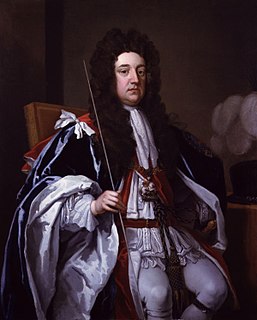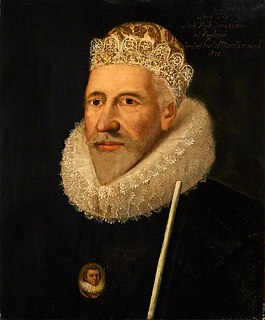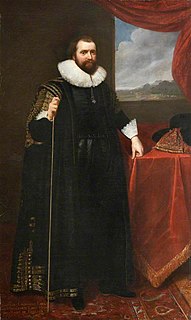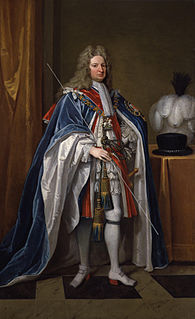 W
WThe post of Lord High Treasurer or Lord Treasurer was an English government position and has been a British government position since the Acts of Union of 1707. A holder of the post would be the third-highest-ranked Great Officer of State, below the Lord High Steward and the Lord High Chancellor of Great Britain.
 W
WSir John Aubrey, 6th Baronet was a British Tory politician. In 1786, he succeeded to his father's baronetcy.
 W
WThomas Clifford, 1st Baron Clifford of Chudleigh was an English statesman who sat in the House of Commons from 1660 to 1672 when he was created Baron Clifford.
 W
WArthur Capell, 1st Earl of Essex, PC, also spelled Capel, of Cassiobury House, Watford, Hertfordshire, was an English statesman.
 W
WSidney Godolphin, 1st Earl of Godolphin was a leading British politician of the late 17th and early 18th centuries. He was a Privy Councillor and Secretary of State for the Northern Department before attaining real power as First Lord of the Treasury. He was instrumental in negotiating and passing the Acts of Union 1707 with Scotland, which created the Kingdom of Great Britain.
 W
WCharles Montagu, 1st Earl of Halifax was an English statesman and poet. He was the grandson of the 1st Earl of Manchester and was eventually ennobled himself, first as Baron Halifax in 1700 and later as Earl of Halifax in 1714. As one of the three members of the so-called Whig Junto, Montagu played a major role in English politics under the reigns of King William III and Queen Anne. He served as Chancellor of the Exchequer from 1694 to 1699 and as First Lord of the Treasury from 1714 until his death the following year. He was also President of the Royal Society and a patron of the scientist Isaac Newton.
 W
WSir Ralph Endersby Harwood was Financial Secretary to George V, Edward VIII and George VI.
 W
WWilliam Juxon was an English churchman, Bishop of London from 1633 to 1646 and Archbishop of Canterbury from 1660 until his death.
 W
WThomas Osborne, 1st Duke of Leeds,, was a prominent English politician. Under King Charles II, he was the leading figure in the government for around five years in the mid 1670s. He fell out of favour due to corruption and other scandals, and was impeached and eventually imprisoned in the Tower of London for five years until the accession of James II of England in 1685. In 1688 he was one of the Immortal Seven group that invited William III, Prince of Orange to depose James II as monarch during the Glorious Revolution. He was again the leading figure in government, known at the time as the Marquess of Carmarthen, for a few years in the early 1690s.
 W
WHenry Montagu, 1st Earl of Manchester was an English judge, politician and peer.
 W
WJames Ley, 1st Earl of Marlborough was an English judge and politician who sat in the House of Commons at various times between 1597 and 1622. He was Lord Chief Justice of the King's Bench in Ireland and then in England and was Lord High Treasurer from 1624 to 1628. On 31 December 1624, James I created him Baron Ley, of Ley in the County of Devon, and on 5 February 1626, Charles I created him Earl of Marlborough. Both titles became extinct upon the death of the 4th Earl of Marlborough in 1679.
 W
WLionel Cranfield, 1st Earl of Middlesex was an English merchant and politician. He sat in the House of Commons between 1614 and 1622 when he was raised to the peerage as Baron Cranfield.
 W
WJohn Norbury of Hoddesdon and Little Berkhamsted in Hertfordshire, was an English courtier, ambassador and Member of Parliament who served as Lord High Treasurer of England.
 W
WRobert Harley, 1st Earl of Oxford and Earl Mortimer, KG PC FRS was an English and later British statesman of the late Stuart and early Georgian periods. He began his career as a Whig, before defecting to a new Tory Ministry. He was raised to the peerage of Great Britain as an earl in 1711. Between 1711 and 1714 he served as Lord High Treasurer, effectively Queen Anne's chief minister. He has been called a Prime Minister, although it is generally accepted that the de facto first minister to be a prime minister was Robert Walpole in 1721.
 W
WLaurence Hyde, 1st Earl of Rochester, was an English statesman and writer. He was originally a supporter of James II but later supported the Glorious Revolution in 1688. He held high office under Queen Anne, who was his sister's daughter, but their frequent disagreements limited his influence.
 W
WRobert Cecil, 1st Earl of Salisbury, was an English statesman noted for his direction of the government during the Union of the Crowns, as Tudor England gave way to Stuart rule (1603). Salisbury served as the Secretary of State of England (1596–1612) and Lord High Treasurer (1608–1612), succeeding his father as Queen Elizabeth I's Lord Privy Seal and remaining in power during the first nine years of King James I's reign until his own death.
 W
WCharles Talbot, 1st Duke of Shrewsbury, KG, PC was an English politician who was part of the Immortal Seven group that invited Prince William III of Orange to depose King James II of England during the Glorious Revolution. He was appointed to several minor roles before the revolution, but came to prominence as a member of William's government. Born to Roman Catholic parents, he remained in that faith until 1679 when—during the time of the Popish Plot and following the advice of the divine John Tillotson—he converted to the Church of England. Shrewsbury took his seat in the House of Lords in 1680 and three years later was appointed Gentleman-Extraordinary of the Bedchamber, suggesting he was in favour at the court of Charles II.
 W
WThomas Wriothesley, 4th Earl of Southampton, KG, styled Lord Wriothesley before 1624, was an English statesman, a staunch supporter of King Charles II who after the Restoration of the Monarchy in 1660 rose to the position of Lord High Treasurer, which term began with the assumption of power by the Clarendon Ministry. He "was remarkable for his freedom from any taint of corruption and for his efforts in the interests of economy and financial order," a noble if not completely objective view of his work as the keeper of the nation's finances. He died before the impeachment of Lord Clarendon, after which the Cabal Ministry took over government.
 W
WSir Archibald Richard James Southby, 1st Baronet was an English Royal Navy officer and Conservative Party politician.
 W
WThomas Howard, 1st Earl of Suffolk, was a son of Thomas Howard, 4th Duke of Norfolk by his second wife Margaret Audley, Duchess of Norfolk, the daughter and heiress of the 1st Baron Audley of Walden.